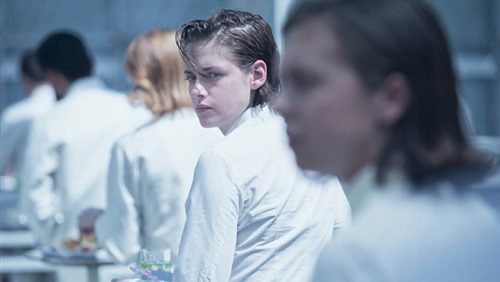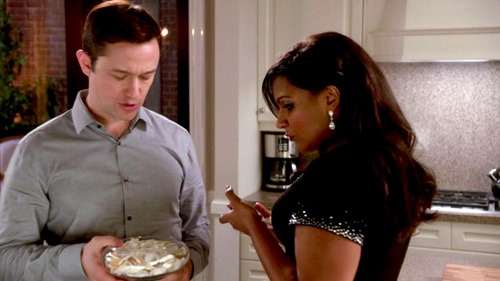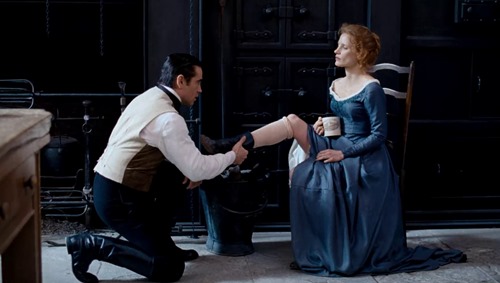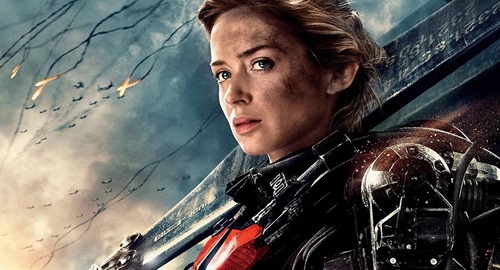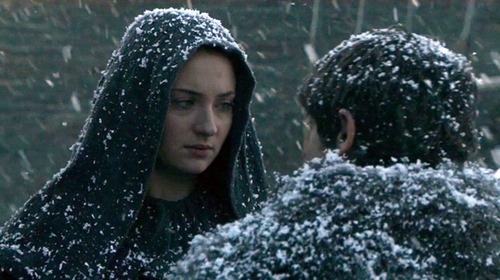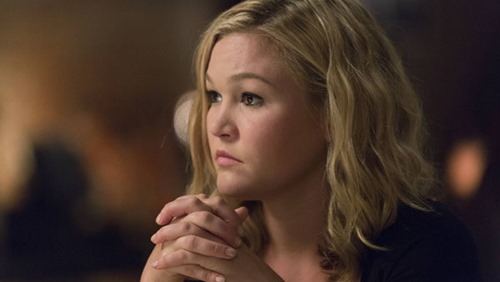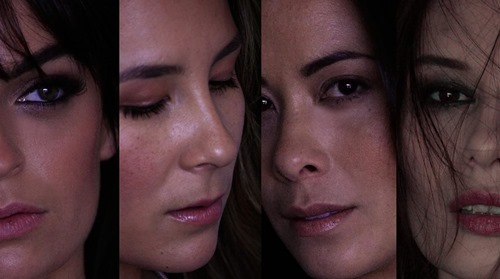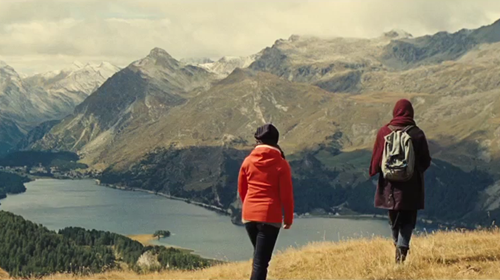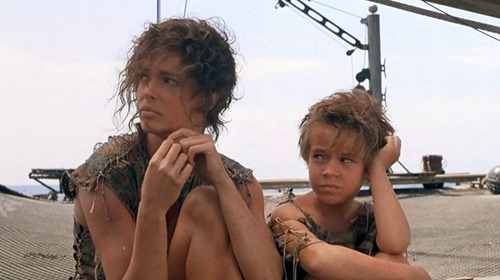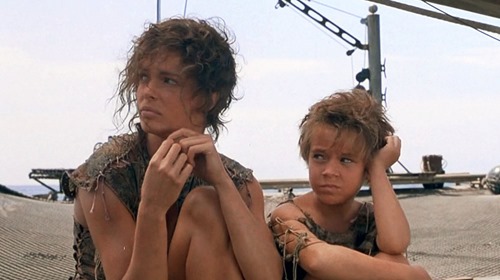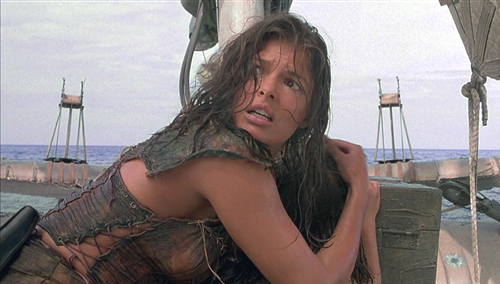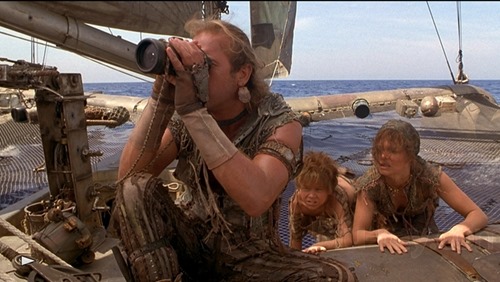Written by Katherine Murray.
Drake Doremus’ dystopian science fiction movie, Equals, presents a pretty good metaphor for mental illness – just not a very challenging one.
Equals, which premiered at the Venice Film Festival this year before coming to TIFF, is set in a future society where people have been genetically engineered not to have emotions. It’s strongly implied that this is the basis for the false utopia the characters live in, where they all wear the same clothes, and live in modular apartments, solving puzzles in the evenings, like so many rational Vulcans. It’s an interesting idea – I, for one, would have liked to hear the characters explain what the purpose of human life was, and why they bothered showing up for jobs, if they didn’t feel any way about anything – but the movie isn’t interested in how this civilization works. Instead, it’s just set up as vaguely bad and communist, in a way that borrows from Nineteen Eighty-Four and other works that came before it, without exhibiting the same interest in social critique.
Instead, the focus of Equals is on personal, idiosyncratic experiences of not fitting in, or being labelled deviant, ill, and outcast because you don’t feel the right way.
The action kicks off when the main character, Silas (played by Nicholas Hoult), develops a rare condition known as SOS. His genetic programming fails and his emotions switch back on, leading him to have a panic attack in his apartment. Trusting the system, he turns himself over to the medical authorities and learns that the prognosis isn’t good. There is no cure for SOS and, while medication can slow the condition’s progression, sufferers eventually become so unstable that they have to be quarantined inside an ominous facility known as the DEN. Living conditions in the DEN are so deplorable that most patients kill themselves within days of arriving and, in fact, they’re encouraged to do so, because the horror of living with emotions is more terrible than death.
Silas, bummed out by this diagnosis but trying not to be, lest he get sent to the DEN, begins to suspect that one of his coworkers, Nia (Kristen Stewart, in one of her best performances yet) is also suffering from SOS, but trying to hide it. The two strike up a friendship that turns into a romance as they bask in the relief of having someone else to talk to about what they’re feeling.
Unfortunately, physical contact of any kind is strictly prohibited in this randomly (and somewhat senselessly) dystopian society – for reasons that, again, I would have been interested to hear about – and, as soon as their fingertips brush, Silas and Nia are on the path to being discovered, with predictably tragic results.
Equals has amazing sound design and a handful of beautiful shots, but it’s not winning any points for originality. The setting is sketched out in pretty vague terms, and the plot doesn’t offer many surprises. If you’re feeling churlish, you can spend all 101 minutes asking why questions that don’t have any answers. Equals isn’t really interested in its own setting except in so far as it establishes the concept “People living here are suspicious of feelings.” And the reason it wants to establish that concept is because the story is really a metaphor for mental illness, designed to tell us that we are too quick to medicate and suppress people whose feelings aren’t normal.
The story in Equals is structured to cover as many contemporary attitudes toward mental illness as possible, and to explore the way that different characters relate to SOS. Nia, distrustful of the system and scared of ending up in the DEN, never tells anyone what’s she’s experiencing and deals with it herself. It takes all her energy, every day, just to act normal; to not let anyone see that she’s different. On the other hand, Silas trust the system and ends up a with a medical record that follows him wherever he goes, counting down the time until he winds up in an institution. Arguably, things are easier for him because he can take medication to suppress his feelings, but he goes back and forth about whether it’s worth it to do that.
Part way through the movie, he joins a support group for other people who have SOS, where each person has a different opinion about how to see the condition and how to live with it. Over the course of the film he goes on a journey where he starts out waiting for a cure and later comes to believe that SOS is a natural part of who he is, and that the real problem is the way everyone else is reacting.
The questions that Silas struggles with are really important and really integral to the lives of people with long-term mental health conditions – especially ones that affect personality development and aren’t going to go away. Is this me or a disease? What does it mean that I’m different from everyone else – am I worse, am I better, am I equally good this way? If someone could cure me tomorrow, would I want to take the cure? Who would I be, if I did?
The metaphor works really, really well. What’s more disappointing is that the movie doesn’t seem to have an interesting perspective on the answers to those questions. Instead of challenging us, it takes the easy way out by setting up a situation where Silas and Nia are clearly correct in their beliefs while everyone else is just… well, crazy. It’s much more like One Flew Over the Cuckoo’s Nest than Benny & Joon – Doremus and scriptwriter Nathan Parker make it easy for us to sympathize with Silas and Nia to the point that a lot of the complexities are lost. Of course it’s better to live in a world where people feel something rather than nothing. Of course people should be able to talk about their feelings with each other. Of course it’s good to fall in love with someone. There are never any negative sides to SOS except that The Man is against you.
This Right Side, Wrong Side, Fight-The-Power-For-Your-Right-to-Be-In-Love stuff not only makes the story less challenging – it also makes it less interesting. The story never swerves away from predictable plot developments and, like a train conductor calling out the stops before you arrive, Equals mechanically foreshadows each and every one, suggests the most obvious possible outcome, and then delivers that outcome on schedule. I’d make a joke about Chekov’s cure for SOS and the convenient six-hour lag time before it goes active, but then I’d be telling you how the movie ends just as blatantly as the director does.
Look – there are things to like about Equals. Kristen Stewart’s good in it, the editing is very well thought-out and emotionally evocative, the sound is really good, and, hey – the metaphor is really good, too. But I wish that the metaphor were in service of a message I haven’t heard before.
Katherine Murray is a Toronto-based writer who yells about movies and TV on her blog.
